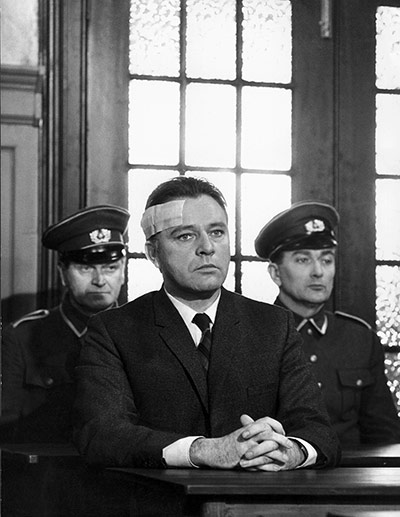
In his cold war novel, adapted as a film starring Richard Burton, John Le Carré sets his denouement in an East German courtroom where the spy Alec Leamas learns the real reason for his mission behind the Berlin Wall. It isn’t strictly speaking a courtroom drama but earns its place for the power of the concluding line of Chapter 23. “And suddenly, with the terrible clarity of a man too long deceived, Leamas understood the whole ghastly trick.” Leamas realises how he has been used by the British Secret Service at just the moment the reader realises: superb Photograph: Sportsphoto Ltd/Allstar

In Barry Collins’s one-man play, a Soviet army survivor of the second world war tells the story of how he and his comrades were imprisoned in the basement of a remote monastery by German soldiers. In the real-life story on which the play is based, the soldiers were discovered but only after they had survived several weeks of incarceration in the dark by eating one another. In Collins’s compulsive monologue, the sole survivor explains what happened. As his horrific tale exerts its grip, the audience realises they are judge and jury, and the soldier says to them at the end, “Comrades, I await your judgment” Photograph: PR
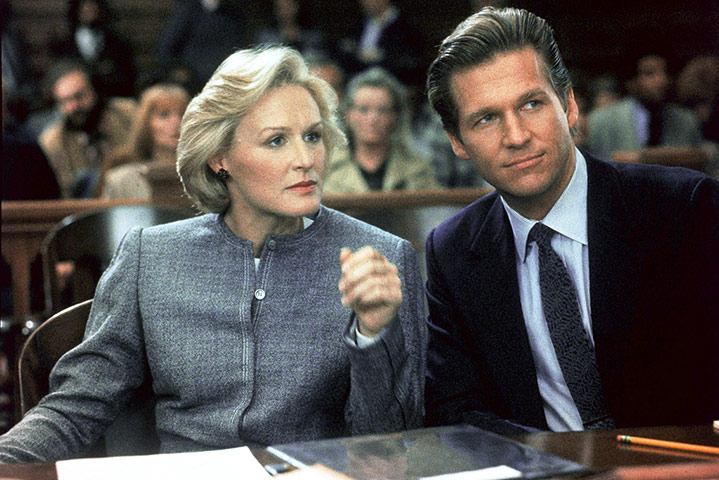
Richard Marquand’s thriller stars Jeff Bridges as the wealthy man who may or may not have murdered his wife and maid in a vicious, Manson-style killing: Glenn Close is the attorney hired to defend him. There are plenty of twists and turns in Joe Eszterhas’s script, both during the court case and after the verdict. Close is superb as the attorney who becomes morally compromised by sleeping with her client. When the verdict comes in, the audience has a feeling that there is more to be revealed, and they are right: the moment Close realises the full duplicity of the true villain is a classic cinema close-up Photograph: Sportsphoto Ltd/Allstar
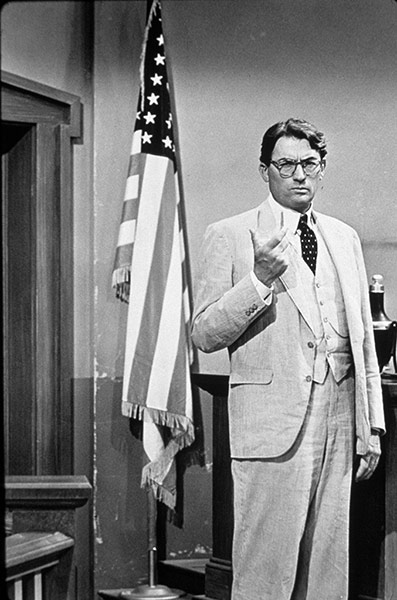
Harper Lee’s classic of American literature is often thought of as a courtroom drama because of Gregory Peck’s performance as idealistic lawyer Atticus Finch. In fact, in the novel, the trial of Tom Robinson does not begin until over halfway and takes no more than a few pages. Lee’s portrayal of endemic racism in the deep south of the 1930s uses the courtroom setting to expose not an individual crime but the ills of society as a whole. Prejudice based on skin colour is what is really on trial, with the jurors and witnesses as guilty parties, and Tom, as the man in the dock, not perpetrator but victim Photograph: Rex Features
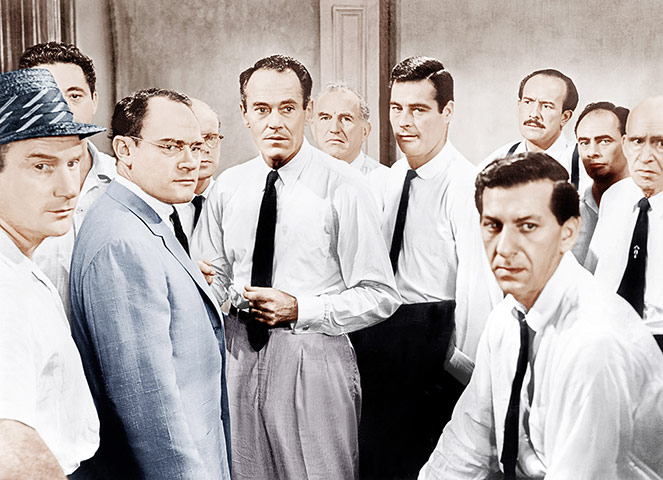
Reginald Rose’s drama was a TV play in 1954, then a stage play, and then in 1957 a film directed by Sidney Lumet and starring Henry Fonda. As it opens, all 11 jurors but Fonda are convinced of the guilt of a young man who has apparently stabbed his father in a rage. During a tense, claustrophobic piece that never leaves the jury room, Fonda’s character throws doubt over one bit of evidence after another, reversing each of the men’s assumptions, until they come to the opposite verdict. It is often cited as the greatest courtroom drama of all, although we never see any of the actual trial Photograph: Everett Collection/Rex Features
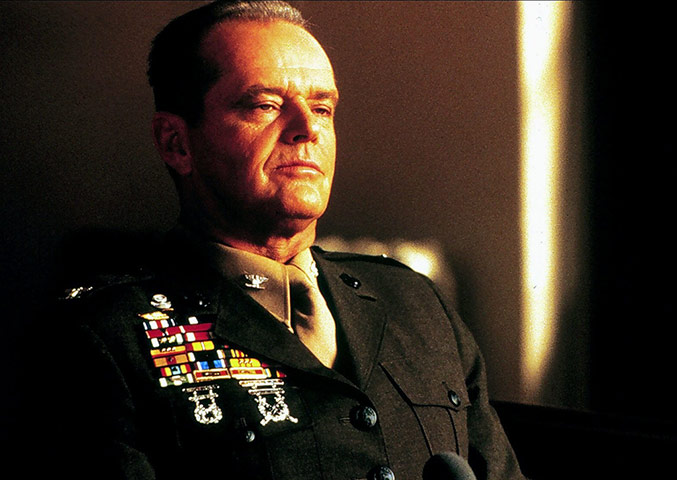
Tom Cruise stars as Lieutenant Daniel Kaffee, the young navy lawyer charged with discovering the truth about the death of a recruit at the hands of two of his fellow marines. Demi Moore is the glamour part of the legal team attempting to discover whether a colonel issued a “Code Red”. Directed by Rob Reiner, this film has one of the best exchanges between a lawyer and a witness of any film in the genre. Cruise explodes with righteous anger at Jack Nicholson’s Colonel Jessup: “I want the truth!” In return he receives the deadly and convincing snarl: “You can’t handle the truth!” Photograph: Cinetext/Allstar
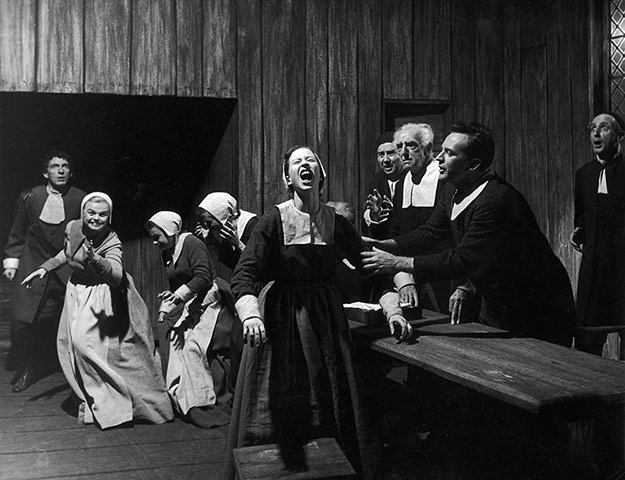
Arthur Miller’s play about the Salem witch trials is sometimes cited as a parable of McCarthyism, although Norman Mailer reputedly retorted that it was “just a play about a bad marriage”. Set in 17th-century Massachusetts, it examines the fallout of an affair between noble, middle-aged John Proctor and teenage hussy Abigail Williams, who is a servant in his house until she is cast out by Proctor’s wife. Allegations of witchcraft ensue and the town becomes engulfed in the trial of Proctor and others. As a portrayal of the way mass hysteria and mob mentality can affect justice, it has yet to be bettered Photograph: Time & Life Pictures/Getty Images
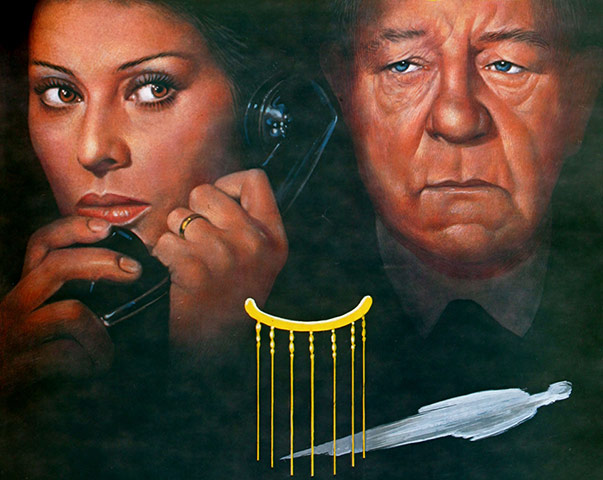
This film shows famous French actor Jean Gabin as a judge, Le président Leguen, wrestling with his conscience, and Sophia Loren at her smouldering best as the femme fatale Teresa Leoni, trying to save the son who is at the judge’s mercy by using every weapon at her disposal, including blackmail and kidnapping. A revelation for those who know Gabin from his matinee idol days as he exudes gravitas from every pore, it’s also a particularly French film as it throws the spotlight on to the omnipotence of a judge coming to his own conclusion without the benefit of a jury. Not to be confused with… Photograph: Sportsphoto Ltd/Allstar
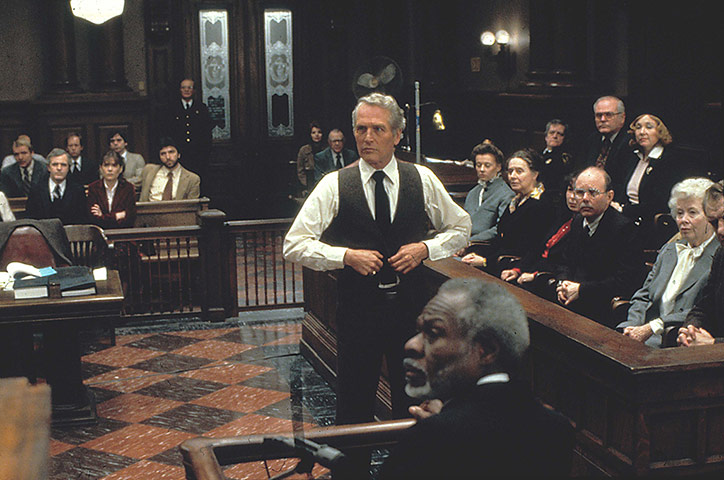
Another one from Sidney Lumet: this time Paul Newman stars as drink-raddled attorney Frank Galvin, attempting to redeem himself by taking a medical malpractice case all the way to trial rather than settling out of court. Many courtroom dramas seem beset by devious but beautiful women determined to prevent a noble man from doing the right thing. In this case she is Charlotte Rampling but there is also a brilliant, brief performance from Lindsay Crouse as a hospital nurse like a fish out of water on a witness stand. It’s a David Mamet script so when the devious woman gets punched we’re supposed to think it’s fine… Photograph: Moviestore Collection/Rex Features

There may not be a jury as we know it in Seneca’s first-century tale, or in Sophocles’s dramatic version Oedipus the King, but there is a chorus to witness and observe Oedipus’s downfall as he fulfils his destiny by accidentally killing his father and marrying his mother. The story has had many incarnations but Ted Hughes’s 1969 play captured the bleak horror of Seneca – although it’s also hard to not to call to mind the refrain of Tom Lehrer’s comic musical send-up, “and he lurved his mother!”
Louise Doughty's courtroom drama novel, Apple Tree Yard, is out in paperback (Faber) Photograph: Tristram Kenton







